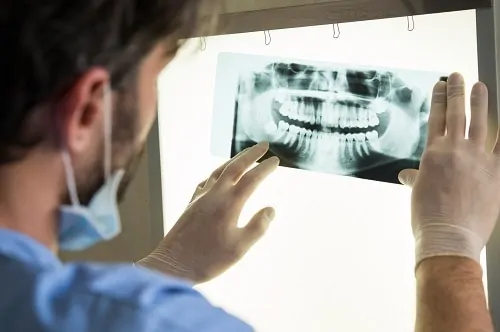Blog
I Haven’t Seen The Dentist in Years. Now What?

At my dental office in Douglasville, we generally advise patients to see the dentist regularly, about every six months, to help maintain excellent oral and overall health. However, sometimes things happen in our lives and we just forget to keep up with appointments or schedule a checkup. We see and treat many patients who have not been able to see the dentist for many years because of many different reasons, but we’re always happy to welcome them!
Why Patients Don’t See The Dentist
These are common, valid reasons people tend to avoid the dentist – for a few months to a few years.
- A bad experience at the dentist in the past makes you nervous
- You’re afraid to find out what is wrong or what repairs you may need
- You’re feeling embarrassed because it’s been awhile since your last visit
- You just simply don’t have time to make it to an appointment or cleaning
Let’s Get Your Smile Back on Track
Your dentist in Douglasville is here to help! You don’t have to feel embarrassed or nervous about coming to the office. Thanks to so many advancements in dentistry and a wealth of state-of-the-art technology, going to the dentist is a whole new experience compared to even just a few years ago. If you have an issue that needs to be addressed, we will talk about your options. You’ll never feel pressured to proceed with any treatment you don’t feel comfortable having. We definitely understand how busy your life can be. That’s why we’ve made it easy to schedule an appointment. From the moment you walk in the door, we will make sure you’re comfortable and that you feel at home. We owe it to you and your smile!
What Will Happen At The Office
When you come to see us, we will be there to help you every step of the way. First, we will make sure we have all of the necessary paperwork on file. We can also work with your previous dentist to obtain any past records or x-rays you may have on file there. If you’ve moved or that office is no longer open, it’s no big deal! We will get you set up and comfortable at the office for a thorough exam (including a new set of state-of-the-art x-rays) to get a better understanding of what’s happening with your teeth. Our team will also take a look at your gums too! This way we know if you need extra special care and treatment for gum disease. We will take the time to get to know you and your needs.
My Douglasville dental office is your new home for comprehensive dental care that you can trust. Our team is educated and excited to work with you to get your smile back in the best shape possible, no matter how long it’s been since you’ve sat in the dental chair!
Accepting new patients from Douglasville, Lithia Springs, Villa Rica and beyond.
6 Surprising Foods That Can Damage Teeth

At our dental office in Douglasville, you’ll hear us talk a lot about the importance of regular dental cleanings at least every six months as well as having a healthy at-home oral hygiene routine of brushing twice a day and flossing once a day. But besides keeping your teeth clean, there’s another way you can help ensure your mouth stays healthy… and that’s by avoiding foods that can damage teeth.
The Scary Six
-
- Popcorn. Some of the most common food related dental damage comes from popcorn. Although it’s popped and mostly airy, there’s always the risk of hitting the occasional hidden kernel. Popcorn kernels are really hard and if they’re bitten with force, the chance of having a tooth crack or chip is high. The pesky husks can also cause problems by getting wedged deep in the gums. If they’re not removed, an infection may occur.
-
- Olives. Well, the olives themselves aren’t exactly the problem. It’s more about the pit that’s sometimes left in place. Where the real danger comes into play is when you’re unsure if the pit is still stuck in the middle or not. When this is the case, take your time and explore the olives, checking for any potential tooth-cracking pits.
-
- Caramels. Caramels have two dangerous aspects to them: the sugar and the texture. Ooey gooey caramels tend to linger on teeth for a long time, exposing them to damaging sugar until it’s removed. The super sticky texture can also be difficult to tear or chew which may loosen fillings or other restorations.
-
- Ice Cubes. Although they’re refreshing on a hot summer day, ice cubes are meant to cool a drink, not to be chewed. These frozen cubes have an especially hard texture which can also lead to dental damage like large chips or even tiny cracks you may not even notice at first.
-
- Other Frozen Food. Besides ice cubes, other frozen treats, like frozen candy bars for example, can be especially dangerous. They take the worst of both ice cubes (hard) and caramels (chewy and sweet) and put them into one damaging food.
- Breads. We know you’re thinking that bread is soft, so how can this be on the list? And you’d be right that most bread is soft, but there are some types of bread such as baguettes that are extra crispy and can be hard on teeth while ripping, tearing, or chewing it.
If you do happen to sustain some tooth damage by eating any of these top culprits, or perhaps something we haven’t listed, we welcome you to call our Douglasville dental office as soon as possible. The sooner we’re able to diagnose the damage, the quicker and easier treatment will be. Don’t wait, call today.
All About Dental X-Rays

Dental x-rays are a vital diagnostic tool used to properly identify any underlying conditions that may not yet be visible on the surface. At our dental office in Douglasville, we perform dental x-rays only as often as necessary, which can vary from patient to patient depending on their oral needs and health history. We also understand our patients may have questions regarding dental x-rays, and we’d like to answer them so you can make the best informed decisions about your health.
Intraoral & Extraoral
Dental x-rays, or radiographs, are usually separated into two categories — intraoral and extraoral. Intraoral x-rays mainly focus on the details of the teeth themselves. While extraoral x-rays still showcase the teeth, the aim of these photos is to look at the bigger picture of the teeth within the jaw and skull.
A Closer Look at Intraoral X-Rays
We already know that intraoral x-rays focus on teeth. They’re also the most common types of x-rays and can help:
- Find cavities
- Check bone health around teeth
- Detect gum disease
Bitewing x-rays are the most frequently used intraoral x-rays. They allow your dentist in Douglasville to see cavities in between teeth that aren’t yet visible on the surface. The images produced from bitewing x-rays also help keep an eye on the wear and tear of any dental restorations, such as a filling or an implant.
Explore Extraoral X-Rays
Extraoral x-rays are less detailed than intraoral images, but still serve a helpful purpose when it comes to looking at:
- Impacted teeth
- The jaw and teeth relationship
- Growth and development
The most common extraoral x-rays are panoramic x-rays. These images show the entire set of teeth as well the jaws in one photo. Panoramic x-rays are great when looking at tooth development or wisdom teeth eruption and can help identify problems with the jaw (TMJ).
We recommend visiting our Douglasville dental office at least every six months. We may not perform x-rays at every appointment unless it’s necessary, but visits twice a year are recommended so we’re able to catch problems early, making them easier, and often less costly to treat.
April is Oral Cancer Awareness Month
Nobody likes talking about any type of cancer. It’s a scary epidemic that continues to take the lives of thousands each and every year. Oral cancer, specifically, is a fairly common type of cancer in the United States with over 45,000 cases diagnosed every year. Of those diagnosed, about 9,700 will lose their battles with the disease. At our Douglasville dental office, we want to take time during Oral Cancer Awareness Month to educate our patients and neighbors on the risk factors and signs of oral cancer, and why it’s so important to catch it early.
The Importance of Early Detection
Oral cancer is very treatable when caught early, which is one of the reasons that maintaining appointments with your dentist is so important. In between your dental visits, it’s best to know the early signs of oral cancer so you’re able to seek treatment quickly.
Recognize the Signs
Oral cancer can develop anywhere from the lips, tongue, and cheeks to in and around the throat. But sometimes diagnosis can be tricky. A lot of oral cancer symptoms can easily be mistaken for other problems. If you recognize any of these signs, call your dentist in Douglasville immediately to schedule an oral cancer screening:
- Chronic bad breath
- A sore or several sores that don’t go away
- A lump on the cheek
- Difficulty swallowing
- Changes in your voice
Know the Risks
There are several lifestyle and hereditary factors that can increase someone’s risk of developing oral cancer. Please know that while these are common risk factors, anyone can develop oral cancer even if none apply to them.
- Gender: Men are two times more likely to develop oral cancer than women.
- Age: The majority of oral cancer patients are over the age of 55 and on average, most people are diagnosed at 62.
- Tobacco: Nearly 80% of oral cancer diagnoses are in tobacco users.
- Alcohol: About 70% of those diagnosed with oral cancer are heavy drinkers.
- Tobacco & Alcohol Combo: Those who use tobacco and drink heavily have a 15 times greater risk.
This Oral Cancer Awareness Month, take control of those risk factors that you CAN change and quit smoking, chewing tobacco, or using alcohol excessively. If you have other questions about oral cancer, call our dental office in Douglasville.
Welcoming patients from Douglasville, Lithia Springs, Villa Rica
“Why Don’t I Get Numb at The Dentist?”

Sometimes we get asked why certain patients have more difficulty getting numb before a dental procedure than other people. At our dental office in Douglasville, we wish we could provide one, solid answer as to why this happens. But the truth is, the reason can vary from person to person, and even from dentist to dentist.
Reason #1: It’s Not You, It’s Us
While nobody likes to admit when they’ve made a mistake, the truth in everything is that mistakes do happen. Including during administration of a numbing agent. Most dentists have more than enough experience, training, and education to get it right most of the time. But if we miss, please know that we don’t like giving you additional injections any more than you like receiving them. We will always do everything possible to keep you relaxed, comfortable, and free of pain during each and every visit, even if we do need to give it another shot (pun intended).
Reason #2: It’s Not Me, It’s You
Now that we’ve established that your Douglasville dentist may accidentally miss the mark, we need to talk about why it’s so important for you to stay as still as possible during the injection. If you flinch or jump, there’s a chance the anesthetic won’t hit the right spot. We know it’s not what anyone really wants to do, but we promise to make it as quick and painless as possible.
Your body can also be the anti-numbing culprit in a variety of ways. First, some people react to the numbing agent differently, and their bodies remove it from the system too quickly. If this happens, you may not get numb at all or only numb for a small period of time. Another possible explanation could be your anatomy. While we know pretty much exactly where each nerve is supposed to be, sometimes we find a patient whose nerve positioning is shifted slightly. So when we think we’re hitting the spot right on, we’re actually not.
Reason #3: It’s Neither of Us, It’s Your Nerves
If you have a tooth that hurts a lot, your nerves don’t behave like they normally do. Sometimes known as a ‘hot tooth,’ an area that’s particularly painful could have nerves that are either overactive or have actually added on additional receptors. Whichever may be the case, both situations require more anesthetic and could make it more difficult to become numb.
We never want our patients to be uncomfortable while in our Douglasville dental office. If you’ve had trouble getting numb in the past, please let us know. We’ll go out of our way to ensure you’re completely relaxed and pain free at all of your visits.
Accepting new patients from Douglasville, Lithia Springs, Villa Rica
Common Dental Emergencies & What to Do About Them
Nobody ever wants to experience an emergency of any kind, and dental emergencies can be particularly concerning and confusing. What’s the right thing to do? What shouldn’t you do? Don’t worry, our dental office in Douglasville is here to help.
Different Emergencies Require Different Care
Not all dental emergencies should be handled the same way, so we’ve outlined some of the most common emergencies and what you can do if they happen to you or a family member. No matter what type of emergency you have, a good rule of thumb is to call your Douglasville dentist as soon as you can.
Chipped or Broken Tooth – First, rinse the mouth and any broken pieces you happen to find with warm water. If there’s blood involved, apply gauze and a bit of pressure to help stop it. Swelling and pain can be reduced with a cold compress.
Knocked Out Tooth – The key to saving a knocked out tooth is to find it as quickly as possible. Once you do, make sure to only touch the tooth crown, not the roots. You can then try to replace the tooth into the socket. If that’s not working, place the tooth in a glass of milk and get to a dentist. Your tooth has the best chance of survival if it’s returned to the socket within an hour.
Toothache – A toothache is typically a sign of a bigger problem and shouldn’t be ignored. Get to your dentist as soon as you can. In the meantime, relieve pain with a cold compress and some medicine. A quick rinse with warm salt water can help too. Whatever you do, do NOT place aspirin directly on the gums as it can cause tissue damage.
Lost Filling – If a filling falls out, it may cause pain because essentially there’s now a hole in your tooth. While you’re waiting to get to the dentist you can buy dental cement at most drugstores that can fill the space. If that’s not an option, a piece of sugarless gum is a short-term fix. Do NOT use gum with sugar as that will increase the pain
At our Douglasville dental office, we’re in the business of keeping smiles healthy, and we never want one of our patients to have a dental emergency. But the truth is, emergencies happen. When they do, we welcome you to call our office for help.
Accepting patients from Douglasville, Lithia Springs, Villa Rica
How to Become a Dentist
At our Douglasville dental office, we love what we do and we find our jobs rewarding. We get to help our patients’ mouths stay healthy, which can directly affect their overall well being, and we even get to see some dramatic smile transformations and change lives. We’d go as far as to say it’s the best job in the world. But how do you know if a career in dentistry could be right for you? Let’s take a glimpse at how you become a dentist and what your job could look like.
What Does a Dentist Do?
You’ve been to a dentist before (or at least we hope!), so you have a basic understanding of what a dentist does. But depending on your own dental experiences, you may not know that a dentist can do a whole lot more than your routine dental exams, x-rays, and sometimes cleanings.
Dentists are responsible for diagnosing problems, developing treatment plans, and treating conditions that affect oral health. They not only look at the health of teeth, but also the gums and the mouth as a whole. Depending on the needs of their patients, dentists’ duties can include removing decayed sections of teeth and replacing them with fillings, eliminating damaged tooth roots and placing a dental crown, and even extracting teeth. They’re a key component to anyone’s medical team and their work is a unique blend of art and science.
Steps to Becoming a Dentist
- Get a Bachelor’s Degree. Most dental schools require a 4 year Bachelor’s degree before admitting students into their doctorate programs. Try to take some classes in biology, chemistry, and other sciences during undergraduate school.
- Pass the Dental Admissions Test (DAT). This exam tests a scholar’s aptitude and knowledge of the sciences. A minimum score is needed to gain entrance into dental school.
- Earn a Dental Degree. In dental school, students will traditionally focus on coursework their first two years, and gain some clinical experience during the final two years.
- Obtain State Licensure. Licensure requirements vary depending on the state you’d like to practice in, but all states require that dentists-to-be pass the National Board of Dental Examinations.
Does the Country Need More Dentists?
If you think dentistry may be the career for you, we have good news. According to the U.S. Bureau of Labor Statistics, the projected job growth for dentists is around 18% through 2024, which is more than double the average growth for other occupations.
At our dental office in Douglasville, we encourage anyone exploring a career in dentistry to perform their own research to see if it sounds like something they’ll enjoy doing.
Accepting new patients from Douglasville, Lithia Springs, Villa Rica.
How to Get a Smile You Love
Not everyone is lucky enough to have naturally straight, white, healthy teeth. Often times things like aging, genetics, or even accidents can affect their appearance and make people want to hide their smiles from the world. But fortunately, nobody needs to live with a smile they don’t really like. With cosmetic dentistry from our dental office in Douglasville, we can transform any smile into one you love and are proud to show off.
What is Cosmetic Dentistry?
Cosmetic dentistry is the term used to explain a number of dental treatments that are effective at not only enhancing the appearance of a smile, but can also aid in maintaining proper function. Cosmetic dentistry treatments can fix a number of common dental concerns including:
- Crooked teeth
- Discolored teeth
- Chipped or cracked teeth
- A gummy smile
Which Cosmetic Dentistry Treatment is Right for You?
While there numerous forms of cosmetic dentistry available, the same solution isn’t appropriate for everyone, even if their concerns are similar. Sometimes the recommended treatment for one person’s crooked teeth is different from what’s right for their friend, for example. Let’s look at some common cosmetic dentistry treatments and explore the variety of problems they can solve.
Tooth Whitening – Just like the name suggests, professional tooth whitening transforms a dull or discolored smile into a bright, white, dazzling grin.
Composite Bonding – Perfect for several dental problems, composite bonding can help fix chips, cracks, crookedness, and discoloration.
Porcelain Veneers – Similarly to bonding, veneers cover the tooth surface and correct staining, chips, and breaks, and straighten smiles. They’re also successful at changing the shape of individual teeth.
Smile Makeovers – A complete smile transformation comes in the form of a smile makeover. Smile makeovers allow your dentist in Douglasville to combine several cosmetic dentistry treatments to achieve your dream smile.
If you’re ready to fall in love with your smile, give our Douglasville dental office a call to schedule an appointment today. We’ll talk about the aspects of your teeth that you aren’t crazy about and discuss the best treatment options to give you a smile you’re proud of.
Accepting patients from Douglasville, Lithia Springs, Villa Rica.
Celebrate Heart Health Month with Your Douglasville Dentist
It’s not uncommon for the month of February to be full of hearts — candy hearts, heart shaped boxes of chocolate, and a whole host of other gifts given in the name of love. At our Douglasville dental office, we’re all for celebrating love, but this February, we’d like our patients to pay attention to a different kind of heart — the one inside you — and ways to keep it healthy.
Fast Facts on Heart Disease
February is recognized as Heart Health Month and is used to raise awareness of the seriousness and widespread occurrence of heart disease in America. Here are some important facts you should know about heart disease.
- Heart disease is the leading cause of death in the U.S.
- Someone has a heart attack every 34 seconds
- Every 60 seconds, someone dies from a heart disease-related event
- You can decrease your risk of heart disease by making lifestyle changes
The Effect of Oral Health on Heart Health
Why should you take heart health advice from a dentist? Isn’t that what a cardiologist is for? Well, yes, a cardiologist is the best person to help diagnose and treat any heart problems you may have. However, your Douglasville dentist can be a crucial part of your health care team.
In recent years, there have been numerous studies that show a clear link between gum health and heart health. In fact, gum disease doubles a person’s risk of heart attack or stroke. But how?
Your gums are like a portal to your bloodstream. An infection in your gums means that the infection can easily enter your bloodstream. When there is infection in your blood, your body reacts. The liver begins to produce certain proteins such as C-Reactive Protein (CRP) and these proteins lead to all kinds of problems including:
- Inflamed arteries
- Blood clots
- Heart attacks
- Strokes
How Can You Minimize Your Risk?
There are ways to decrease your chance of gum disease and the overall health concerns associated with it. Start with maintaining regular visits to our dental office in Douglasville. In between appointments, make sure to brush your teeth twice a day, floss everyday, and avoid tobacco products. Proper dental care can, in fact, save your life.
Accepting patients from Douglasville, Lithia Springs, Villa Rica
What Causes Bad Breath?
Halitosis, also known as bad breath, is a common issue that affects nearly 80 million Americans. It’s a serious problem that doesn’t only affect your oral health, but can directly impact your personal life as well. Don’t worry, your dentist in Douglasville is here to help.
Dry Mouth
Your mouth needs an adequate saliva supply to keep itself healthy. Essentially, it helps wash away bacteria and neutralize acid that can lead to decay and cavities. Without it, bacteria are left to linger around and cause all sorts of problems, including bad breath. Dry mouth can be caused by numerous things including some medications or mouth breathing.
Foods
Although fragrant foods don’t tend to be a serious, long-lasting problem, they are a cause of bad breath. The typical culprits like your morning cup of coffee, a garlicky pasta sauce, or a tasty onion-packed sandwich can sometimes leave an after-smell in your mouth, even after you brush and floss.
Poor Dental Hygiene
When someone doesn’t follow a proper at-home oral health routine of brushing twice a day and flossing once a day, the chance of odor causing bacteria sticking around and creating an unpleasant stench increases. Not to mention, poor dental hygiene can lead to more problems like cavities, the need for root canal treatment, discoloration, or even tooth loss.
A Whole-Body Problem
While bad breath may seem like a small yet embarrassing issue, it may be a sign that something more serious is happening somewhere else in the body. Bad breath has been linked to:
- Gum disease
- Pneumonia
- Liver or kidney disease
- Diabetes
This is why the team at my Douglasville dental office encourages anyone suffering from chronic bad breath to see their dentist as soon as possible.
If you’re worried about bad breath, or it’s just time to see a dentist, we welcome you to call my dental office in Douglasville to schedule an appointment. We’ll be happy to see you and discuss any dental concern you may have.
Accepting patients from Douglasville, Lithia Springs, Villa Rica and the surrounding areas.






